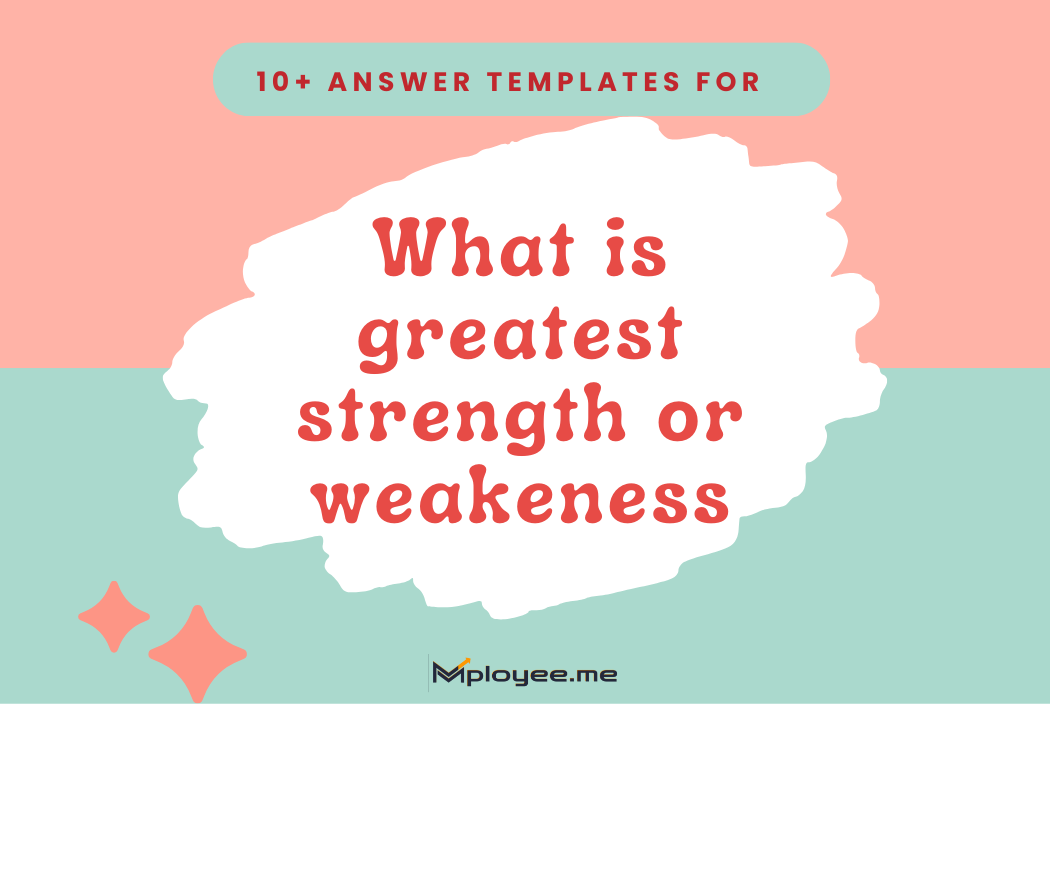
We'll cover
What Is Your Greatest Weakness/ Strength - 10+ Examples
Written By Editorial Team

Usually, the interviewers ask one such question to know the biggest strength and weakness of the candidate. With this question, they will get to know how truly self-aware and honest and adaptable you are. To give a strong interview answer, there needs to be some preparation and strategy, along with a clear understanding of what employers usually look for in their candidates. In this article, we will cover why interviewers are interested in strengths and weaknesses, how to answer this job interview question properly, and 15 sample answers for gaining success in your next interview. Along with that, we will discuss learner strategies that will add positive weight to your answers and increase your chances of getting hired.
We'll cover:
Why Do Interviewers Ask This Question?
Interviewers ask you about the biggest strength and weakness to know whether you fit the job or not. Your answer will give them an idea about:
- Your level of self-awareness.
- Your ability to improve and adapt.
- Problem solving ability.
- If your strength is aligned to the job role.
- Are you able to take constructive criticism and grow professionally?
- Your honesty and confidence in driving discussion on personal and professional development.
It tests your professional comfort zone-movements and your self control. If it is answered well, it can be your ace in getting to the top of a lot of other candidates and leave a favorable impression in the minds of human resources managers.
Examples of Biggest Strengths
Below are examples for the job interview question and answers on biggest strengths while for full time jobs or part-time jobs. These answers will go a long way to showing the interviewers that you are really self-aware, flexible, and have the potential to grow.
Top Strengths with Examples
• Adaptability
Example: My greatest strength is adaptability. In my last job, I had so many changes in processes and tools that I had to quickly learn just to remain productive in such a fast-paced area.
• Problem-Solving
Example: One of the things where I truly excel is problem-solving. I enjoy getting into the complexity of an issue and helping in resolving it with an efficient solution that favors the business.
• Leadership
Example: My greatest strength would be leadership; I lead teams in completing projects before deadlines and at high quality.
• Communication
Example: For me, the greatest strength is communication; I can convey ideas very clearly and maintain solid professional relationships.
• Time Management
Example: It's one of my biggest strengths in being able to manage time wisely to guarantee that I hit deadlines and provide excellent results.
• Work Ethic
Example: My greatest strength is my dedication to hard work. I consistently go above and beyond to achieve company goals.
• Attention to Detail
Example: One of my strengths is attention to detail; I make sure that my work is accurate so that there are fewer errors and it will take less time.
• Creativity
Example: My greatest strength is creativity; it allows me to think of new solutions for difficult problems.
• Teamwork
Example: I believe teamwork is my biggest strength. I work together with everyone and enable the success of the projects and team goals.
• Resilience
Example: Of my many strengths, resilience is one. I look at setbacks positively and focus on looking for possible solutions rather than lingering in problems.
• Timely Completion
Example: Time management is another quality that I am good at that has made it possible for me to meet deadlines and produce quality work.
Examples of Biggest Weakness
Here are some examples of answering your weakness question:
Top Weaknesses with Examples
• Perfectionist
Example: It is my greatest weakness. In the job interview, sometimes I take a perfectly long time to the minutest detail.
• Public Speaking
Example: One of the biggest weaknesses is public speaking. I panic even now, and even though I am taking steps to make it better, I still panic.
• Delegation
Example: I have this biggest weakness in any of my interviews, at times I can't delegate things because starting from scratch to reach the perfection stage is in my head.
• Impatience
Example: Impatience is one of my greatest weaknesses. I want immediate results, and I find it difficult to wait for long-term success.
• Take On Too Much Work
Example: My biggest weakness in interview is to over-commit myself sometimes, which leads to burnout.
How to Never Answer "What Are Your Strengths and Weaknesses?"
Avoid these kinds of mistakes in answering this question for a job interview:
Common Weakness Answers to Avoid
• Too Vague
Example: I don't think I have any weaknesses.
• Irrelevant Answers
Example: My biggest strength is being a great cook.
• Sound Arrogant
Example: I really do not believe in weaknesses because I'm perfect.
• Too Negative
Example: I'm awful at working as a team.
• Too Generic
Example: I think I sometimes work too hard.
• No Improvement
Example: I am bad at time management, and I don't know how to fix it.
How to Select the Perfect Strengths to Impress the Employers
Choose the appropriate strengths by:
- Understanding the Job Description - It would be best if you aligned your strengths with what the employer is looking for.
- Give Valid Examples - Specify instances at which you have demonstrated their strengths.
- Be Real- Choose genuine strengths that actually reflect the true being of skill and abilities in them.
- Emphasize The Company’s Advantage - Show how strength benefits an organization.
- Avoid the Cliché Statements - Citing skills as general is going to be less impressive for any employer.

How to Make Your Weakness Sound Like a Strength
When talking weaknesses, talk improvement and growth as shown in the following format:
- Identify a genuine weakness
- Expose how you are working to improve it
- Show progress or strategies to mitigate the weakness
- Frame weaknesses as opportunities for growth
- Highlight learning experiences that have shaped your development
Examples of How to Make Your Weakness Sound Like a Strength
Weakness: "Public speaking is a challenge for me."
Solution: "I have been working to develop my weakness through public speaking courses and practice in smaller group settings."
Outcome: "Over time, this grows me to be more confident in addressing larger audiences."
STAR Method for Answering Strengths and Weaknesses Questions
The STAR method helps to effectively structure your responses for biggest strength and weakness:
- Situation- Describes the proper context of your strength or weakness.
- Task- Explain what kind of challenge you faced.
- Action- Supervisor states that it needs to really find steps to overcome that.
- Result- Post positive outcomes that would complete your response to this question.
Example in the STAR Method:
STAR for Strength:
Leadership:
- Situation: "In my last role, our team struggled with project deadlines."
- Task: "As team lead, I needed to improve efficiency in workflow."
- Action: "I implemented a project management tool and held weekly check-ins."
- Result: "We reduced project delays by 30% and improved efficiency."
STAR for Weakness:
Delegating:
- Situation: "I used to take on too many responsibilities myself."
- Task: "I realized that I need to trust my team more."
- Action: "I started delegating tasks and giving clear instructions."
- Result: "My team was more productive and I had time for developing strategic plans."
Mistakes to Avoid in Strength and Weakness Interview Answers
Understanding what to avoid is essential when confronting the question on strengths and weaknesses in the interview.
Too Generic – Do not say, for example, "I work too hard" in strength and weakness interview questions answers.
Lack of Self-Awareness – Saying one does not have any weaknesses will weaken your strength and weakness interview answers.
Misaligned Examples – Giving irrelevant strengths decreases your credibility when answering strength and weakness for interviews.
Overused Responses – The clichés multiply in your impact when answering what are your strengths and weakness in an interview.
Overconfidence – Overemphasizing strengths harms the perception of your strength and weakness in the interview.
Avoiding these points will definitely make your answer stronger and improve your odds in the strength and weakness-for-interview.
Strength and Weakness for Interview: Tailored by Industry
Each industry values different traits, so customize your answer to what is your strength and weakness accordingly.
- Tech Industry - Strengths like problem-solving work best in strength and weakness interview answers for IT roles.
- Healthcare - Compassion is a good example for the strengths and weaknesses in interview answers.
- Education - For teaching jobs, patience is the best thing to put in your strength and weakness interview questions and answers.
- Marketing - Creativity is very important when answering the strength and weakness question considered for branding.
- Finance - Analytical thinking will fit great in the strength and weakness for interview for finance jobs.
Specific industry-related answers will make your strength and weakness interview answers very much more powerful and aligned with the job.
Psychological Angle Behind “What’s Your Strength and Weakness?”
Knowing why interviewers ask 'what is your strength and weakness' makes you confident in answering.
- Self-Reflection – The employer checks whether you applied any personal analysis before stating the strength and weakness during the interview.
- Growth mindset – Showing progress demonstrates maturity in answering what you consider your strengths and weaknesses during an interview.
- Stress Handling – Responses to strength and weakness in interview situations are sometimes used to judge candidates under pressure and somewhat critique them.
- Professional Awareness – The greater your awareness of your own gaps, the better your strength and weakness in interview questions answers.
- Fit for Role – Customized strengths should best resonate with how well your what's your strength and weakness is able to align with the job duties.
When you grasp the psychology, your strength and weakness in interview answers imply depth and intent.
How Freshers Should Answer Strength and Weakness in Interview
Freshers face problems with questions about strengths and weaknesses during interviews owing to their lack of working experience.
- Academic Examples - Use college projects in strength and weakness for interview answers if you lack work history.
- Learning Skills - Displaying a willingness to learn is fine in answering the strengths and weaknesses interviews.
- Group Work - Use examples of group work in the classroom to flesh out strength and weakness in interview questions answers.
- Initiative - Show little leadership instances in your strength and weakness answers.
- Time Management - Bring up how you worked with deadlines during your studies in your strength and weakness interview answers.
Freshers can impress by demonstrating a strong sense of self-awareness and adaptability in their answers about strengths and weaknesses for an interview.
Red Flags to Watch in Your Own Interview Answers
Even good candidates sometimes commit errors while answering the "What is your strength and weakness" interview question without realizing it.
Contradictory Statements – Saying you are detail-oriented but rushing work touches upon the strength and weakness in interview questions answers.
No Progress – Lacking progress hurts your strength and weakness interview answers.
Too Job-Specific – Avoid strengths that are too narrow for strength and weakness in interview questions answers.
False Modesty – Saying, "I'm just lucky," for what's your strength and weakness answer reflects a lack of self-worth.
Irrelevance – If the answer you give for strength and weakness interview question is not supporting the role, that loses the value.
Avoid such red flags to keep your strength and weakness interview answers professional and convincing.
Conclusion
To answer the biggest strength and weakness interview question, you'd have to be prepared and, more importantly, self-aware. By choosing the most relevant strengths, framing the weaknesses positively, and the STAR method, one would be able to provide impressive job interview answers that speak volume about growth and professionalism. Sample answers and helpful job interview tips will empower you to answer this typical job interview question and leave a strong impression on hiring managers. With the right treatment, this job interview question becomes a channel to reveal and showcase one's skills, personality, and readiness for a career path.
What would be your best answer for strengths and weaknesses?
Although preparing an answer for this question is of key importance, the suggestion is to always be truthful. Select your biggest strength matching your role: communication or problem-solving. Then give your biggest weakness: public speaking, for instance, and explain what you are doing to overcome it. A complete answer basically addresses the two areas: consciousness and action.
What are your top 5 strengths and weaknesses examples?
What is the best answer for weakness?
Why should I hire you?
Where do you see yourself in 5 years?
How do you deal with stress and pressure?
What are your expectations for salary?

Got Your Answer ?
Learn this in 30 Seconds 👇
Career Blogs
Our career blog is your go-to resource for insightful advice, practical tips, and the latest trends in the job market.

Office Address: Room No 305, IIT ROPAR-TBIF, Top Floor (East Wing), M.Visvesvaraya, Rupnagar PB, 140001
- Free Online Resume Review
- Check Resume Score
- Job Description Keyword Finder
- Resume Shortlisting Software
- Resume Scanner for Jobs
- Find jobs that match with resume
- Job matching platform
- Resume job matching
- Job suggestion
- Best sites to find jobs
- Free ats resume scanner
- Auto apply for job
- Full Time Jobs
- I Need a Job
- Information Technology Jobs
Can't Find Something? Get in Touch.
©2026 Padhakku Peek A Book Pvt Ltd (Mployee.me)






